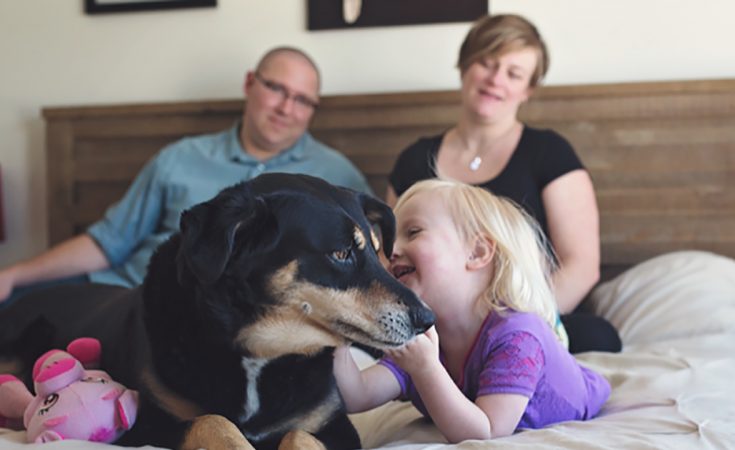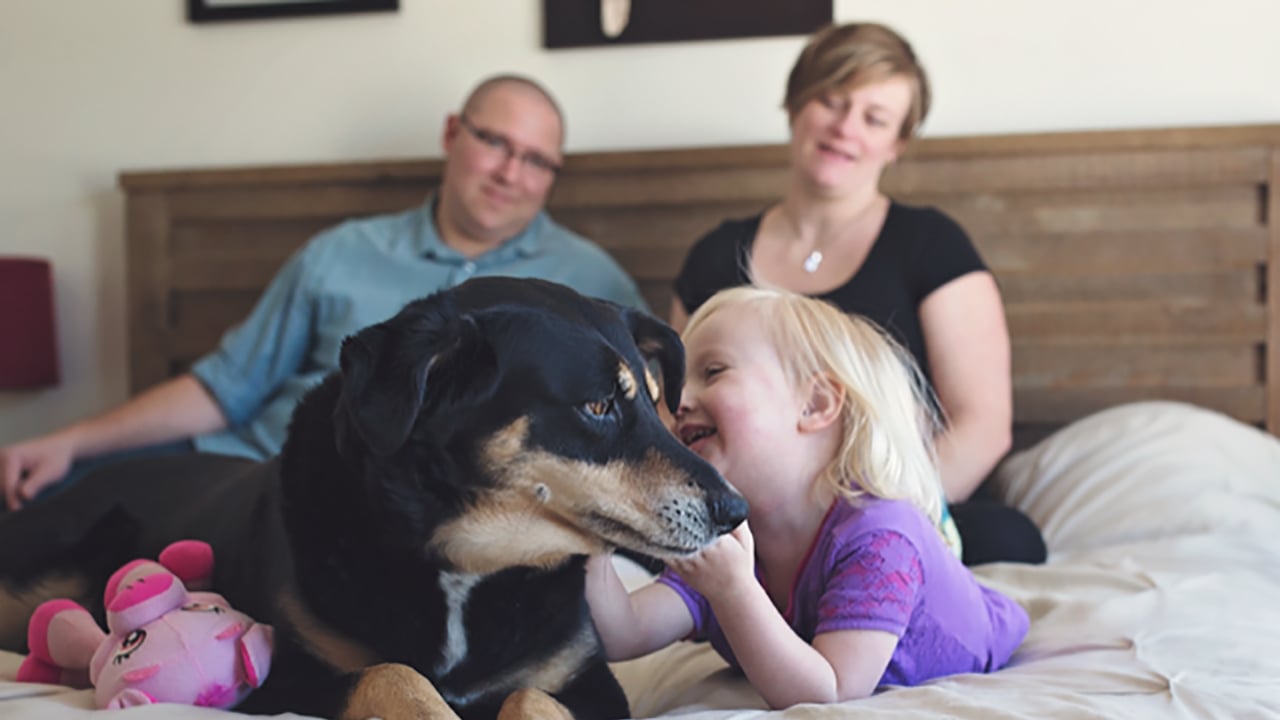I let my kids know that grief is normal and it takes time to process the death of a family pet.
Our beloved dog, Roxy, died at the end of 2021. She was the second commitment my husband and I had made to each other—right after buying our first house (with a fenced backyard), and before marriage, kids, or any of the other grown-up things we would decide to do. Though Roxy was always slightly baffled that we would complicate her perfectly peaceful existence with louder, smaller versions of ourselves, our kids, now 6 and 10, have never known life without a K9 companion.
As Roxy’s health began to decline in the final months of her life, my thoughts began to turn to one of the most complex things we all inevitably have to face as parents: How do I support my kids through the grief of bereavement?
Here’s what helped us.
1. Feel it all, and validate those feelings
I will never forget the sound of my husband’s sobs as the home euthanasia vet let us know that Roxy was gone. Even though he’s not a particularly “macho” guy, I had never seen him cry—not on our wedding day, not when our babies were born, never. Some deeply buried cultural conditioning about what it means to show emotion was released from him that day, and it was as if our entire family was given a permission slip we didn’t know we needed that said: it’s okay to cry.
I’m guessing your kids, if they’re like mine, have no compunction about crying. But there’s a subtle message we, as their parents, send when we try to remain stoic even when we’re hurting. Kids do still need to know that they’re safe and secure even if their adults are coming apart at the seams a bit, but expressing your emotions honestly is a powerful way of modelling healthy emotional range and regulation.
And so we wore our pain on our sleeves in those first few weeks, held each other through it, and it has brought us closer than we’ve ever been before.
2. Create a meaningful ritual
We spent the days and weeks after our pup passed telling stories, creating art, and poring over pictures of Roxy. It wasn’t until my son started having impromptu “funerals” on our family outings that we realized how important these little rituals of grieving were to his ability to process something as complex and overwhelming as loss.
We humans are ritual beings—we ritualize everything from birth to death to the way we make our morning coffee. And there’s a reason: Ritual is a way of putting a pin in the map of our lives and saying “this matters”—a way of marking the turning points in our days, seasons, years, and lives. Contrary to what we often think, ritual doesn’t have to be all “bells and smells,” as death doula and ceremonialist Sarah Kerr says, but it can be a simple action imbued with meaning and intention. My son caught on to this quickly, and our “funerals” involved circling around piles of twigs, or touching a rock together. These tiny ceremonies meant something only to him but gifted us all with the opportunity to tend to our grief.
Ritual also helped to make the nebulous nature of death a little more concrete. I would describe our family as spiritually curious but non-religious. When Roxy died, there was a lot of talk about “the rainbow bridge”—does it exist?—and some hard questions about what happens when we die (which I think beats out “where do babies come from” when it comes to Inevitable Questions Parents Somewhat Dread). Challenging though it was, these questions gave my husband and me an opportunity to have a much-needed conversation about our beliefs and values. Honesty was at the forefront, for us, and though we had to profess that we only had a few meagre but beautiful ideas about what happened to Roxy, our little family rituals acted as a landing pad for the complexity of our grief – something we could do, something we could see and touch.
3. We took our time
We decided that in a society that often—metaphorically or literally—asks grieving people if they’re done crying yet, we’d abide by the mantra, “Have you cried enough yet?” Roxy’s ashes still sit on the shelf in our living room, a giant poster we made with pictures of her from her puppy years to her final days still adorns our hallway, and we still shed tears occasionally as we remember her.
Trusting that eventually these hard feelings would pass, we reminded the kids that we would probably feel sad for a long time—and that maybe there would be a little sadness every time we thought of our dog—but that that was okay; there was no need to push it aside or move on before we felt ready. As Kerr says, some grief doesn’t go away. But it goes from being something that feels all-consuming to something that, with time, becomes its “right-size” in your life.
Now, as we wait for the ground to thaw so we can bury her ashes under her favourite lilac tree, I can say wholeheartedly, that our grief for Roxy is “right size,” and that her final gift to us was the opportunity to show our kids how to navigate loss and emerge more closely bonded, stronger, and more emotionally attuned than ever before.
Stay in touch
Subscribe to Today’s Parent’s daily newsletter for our best parenting news, tips, essays and recipes.



































